- Home
- Tim LaHaye
Edge of Apocalypse Page 23
Edge of Apocalypse Read online
Page 23
Looks like it's time to take a calculated risk.
Ten minutes later Joshua was seated in a private room off the main dining room, behind polished mahogany doors that had been closed, eating dinner across the table from an attractive middle-aged woman.
Joshua took another bite of his filet mignon. He had noticed that his host was fashionably dressed. Though Abby would have recognized even more, like the exclusive Vera Wang dress, and the carat weight of the diamond studs in her ears--likely two carats each.
"Sorry to be so secretive," the woman said. "But I know you're currently undercover, Mr. Jordan. First, let me tell you how much my husband and I appreciate you."
Joshua flashed a quick smile and said, "Thank you," but he immediately had several questions. "Your husband is described in your note only as 'The Patriot.' Do I know him?"
"I don't think so." Then she added, "but he thinks you're on the right track. He wanted you to know that."
"Which track would that be?"
"Your distrust of Senator Straworth. And perhaps a few other members, or their staff, on the special committee investigating the North Korean missile crisis. My husband also agrees with your decision not to give them the RTS design information. Some members of that committee cannot be trusted."
It was clear this woman had a sharp understanding of Joshua's world.
"I applaud you and your husband, whoever he is," Joshua said. "You apparently have a grasp of issues that the media hasn't covered."
She smiled. There was something behind the smile. Her next comment told Joshua a lot.
"Sorry to be so clandestine. But we both need to be cautious."
Her choice of words rang bells. So Joshua pushed a little.
"What is it you came here to tell me?"
"You're in danger."
"That's not very specific."
"I realize that. Let's just say that I'm not talking about the things you're already aware of. Like the crazies out there who don't understand the reasons for what you did. Or the Capitol Hill political bunch that wants to bury you. None of that."
"Then what?"
"We have the distinct sense, from multiple sources, that you are at substantial risk from foreign actors."
Again, her choice of words, the familiar intelligence lingo, rang a bell with Joshua.
"What can I do about it?"
"Nothing yet. I just want you to know we are out there. And if you are willing, then we can set up a meeting so you can be briefed in more detail."
"This is all very interesting...but I still don't know your name."
"For now I'm just the Patriot's Wife," she said with a smile.
Then she reached inside her little purse, which was exquisitely decorated with white beads, and pulled something out. She laid it on the table. A white business card. All it said was The Patriot. And there was a telephone number.
He took the card, fingered it, then looked over at the woman. Now it was time to get blunt. "How do I know I can trust you...or your husband?"
"That should be simple," she said with a grin. Then she rose to leave.
Ever the gentlemen, Joshua rose to his feet with her.
She reached out and shook his hand. Then before turning to leave, she said one more thing to Joshua. "Perhaps you can reflect on two things. First, we were able to locate you here, even though you took precautions to hide from the federal authorities. The U.S. marshals haven't been able to find you so far. But we did."
"And the second?"
"We haven't reported you."
FORTY-SIX
In the crowded upscale piano bar called Johnny One Note on Park Avenue South, attorney Allen Fulsin was sitting across the booth from his contact. They'd just ordered drinks and were engaging in small talk. But the other man, Bill Cheavers, an executive vice president for the North American Division of World Teleco, was getting impatient.
"Allen, you said you had inside information for me."
"Are you up to speed on the pending negotiation between World Teleco and a media group called Mountain News Enterprises--MNE?"
"It's no longer a pending negotiation. It's a signed media distribution contract. I'm not sure I want to go into any more details than that. Maybe you should talk to our corporate lawyers."
Allen Fulsin laughed coarsely and said, "Oh no, Bill, that's definitely not what I ought to do."
"Why not?"
"I'm a lawyer. I know what happens when the pencil-neck corporate counsel inside an organization like yours gets a whiff of this kind of insider information. They get all nervous. They run to the first whistle they can blow. They threaten to call in some federal agency to look into it. All because they don't want to get caught in the middle. Or lose their law license. Or worse."
Bill Cheavers glanced around the bar quickly for any familiar faces. Finding none, he turned to the lawyer across from him.
"Okay. Look, Allen, the only reason that you and I are having this discussion is that you handle my sensitive, personal legal stuff. So let's get to it."
"That media group MNE is a cover."
"For what?"
"A radical group. Don't know the name. But it meets secretly. Some very powerful people in it."
"How do you know this?"
"As luck would have it, a retired former Idaho State supreme court judge named Fortis Rice approached me about this secret group, you know, to feel me out. They meet regularly in some clandestine spot in the Rocky Mountains."
"Why'd he approach you?"
"His group needs some more legal muscle, I guess. I think it's because they liked some of the issues I argued when I was in the solicitor general's office. Frankly, I didn't agree with half the cases I had to argue, but that's Washington. You do what you got to do and pretend you believe in it. I must have been more convincing than I realized..."
"And this group you mentioned..."
"Yeah. Full of extreme anti-Corland people. It seems that you either have to be filthy rich or really well connected--or both--to be invited in. I guess they thought I was the latter. I'm sure not the former, though I'm working on that one." And then Fulsin smiled and took a swig from his glass.
"And they don't know you have a connection to me, as my personal lawyer?"
"Naw. The question Rice asked me was whether I ever represented World Teleco. And I said no. Which is technically correct. Very technically."
"But how'd you find out about the connection between Mountain News Enterprises and this secret political group?"
Allen Fulsin laughed again. "Because after Rice talked to me I started digging around like a West Virginia coal miner. Looking for information. And I know how to find it in this town. Hey, when opportunity knocks..."
Bill Cheavers was putting it all together in his head. Then he had a question to ask. "Which leads me, Allen, to the obvious question: what's in this for you?"
"Just trying to be a good Boy Scout."
"Come on, what do you want out of this?"
"Bill, all I need you to do is to make sure this contract between World Teleco and Mountain News Enterprises on behalf of Rice's group goes nowhere. You don't have to be concerned with how I benefit from it when that happens."
"If we breach a signed contract on a national media buy like this--wow, that could be a real litigation nightmare for us."
"Consider the consequences."
"Such as?"
"This covert group is planning on taking aim against the Corland administration. Real scorched-earth stuff. By facilitating their plan, whatever that is, World Teleco is going to stir up the wrath of the White House."
"We may have to take our chances."
"You definitely don't want to do that."
"Why not?"
"The White House could bring down your company's entire telecommunications empire, Bill. Seriously. Along with your World Teleco stock portfolio, your profit-sharing plan. You get the picture?"
"That's a bold claim. Outrageous, actually. I need specifics."
Bill Cheavers was stunned. He pushed his glass away from him, then he said, "But a breach of contract..."
"Companies do it every day," Fulsin said. "Have your lawyers find some loophole. That's what you pay them for." Then he bent forward and said, "You've got to stop this media plan from happening." After looking at his watch, Fulsin added, "In one hour you'll get a call from a restricted number. Pick it up. It will be the White House. After that call I think you'll want to pull the rug out from under this Mountain News Enterprises deal."
Bill Cheavers didn't finish his drink. He got up quickly and looked around the bar once more. His last words to the attorney were, "I'll be waiting for that call." Then he left.
Allen Fulsin emptied his glass and exited a few minutes later.
That was when another man at the bar, who had been watching the two of them, pulled out his Allfone and dialed a number.
A man answered the phone on the other end and simply announced, "This is the Patriot."
The man at the bar said, "I've just eye-balled the rendezvous between Fulsin and a fellow named Bill Cheavers."
"Who's Cheavers?"
"High-ranking executive with World Teleco."
"Okay. Keep on it. Get the information to me in the usual way."
"Will do."
The man at the bar clicked shut his encrypted Allfone, paid his tab, and left.
In downtown Philadelphia, at the police headquarters, John Gallagher was getting tired of waiting. He was supposed to meet with the detective who was going to show him the surveillance footage of the lobby of the corporate building where Roger French worked. But just before Gallagher arrived, the detective was pulled out on another field investigation.
Gallagher glanced at his watch. Man, I'm going to have to ditch my plane reservation. I'll never make it to New York in time to meet with Miles first thing tomorrow. Maybe there's a late train I can still catch.
Gallagher called the ticket office for the express train. Yes, he could still catch the last one, which left in ninety minutes. He booked it over the phone.
That was when the detective strode into the video viewing room where Gallagher had been waiting. He had a uniformed cop with him.
He delivered his weary apologies to Gallagher, then turned to his video forensics officer and told him to start running the footage.
Gallagher's eyes were fixed on the paper-thin flat-screen monitor on the wall.
The time and date were running in the lower right-hand corner of the black-and-white video as the image of an empty corporate building lobby was cast on the screen.
"Sorry they didn't use color footage. But these building owners always go the cheap route."
"No, this is better," Gallagher muttered. "Black-and-white gives you better definition. At least for what I want."
The tech guy then fast-forwarded the video to the point in time two hours before the estimated time of Roger French's death. Then he slowed it down only slightly.
Until they saw the image of a man in a suit entering the lobby.
"Stop there!" Gallagher shouted out.
They froze the frame.
A man of medium height. Well dressed. Broad shoulders. Confident strut. But his head was slightly turned away from the camera.
A shiver crawled up Gallagher's spine.
"Zoom in."
The tech guy brought the image closer. It blurred a little with magnification.
Gallagher stared at it. He had to know. Was it Atta Zimler?
"Okay," he said, "roll it, but very slowly, frame-by-frame."
So the tech did.
The man in the lobby, as he was caught in each sequential, choppy frame, had kept his face turned away.
Then he brought his face back toward the camera.
Gallagher stood up.
"Let me see ya, you stinkin' scum...show your face!"
The man in the lobby, in the jerky frames, kept looking down, fiddling with the buttons of his suit coat, keeping his face hidden.
"Look at me!" Gallagher shouted out.
And just then, as the man in the lobby was approaching the elevator doors, he gave a side glance toward the watch on his left wrist, revealing about half of his face.
"Stop!" Gallagher yelled out.
The frame froze.
"Bring it in..."
The tech magnified the frame until a face could be partially seen.
Gallagher walked right up to the screen. He touched it with his index finger.
"I know it's you. I know it!"
Then Gallagher wheeled around. "Can we get an immediate high def JPG image of this emailed to somebody?"
The video forensics officer came out of the control room and looked at the detective, who nodded the okay.
Out of his wallet Gallagher fished an email address for the Facial Identification Unit of the Biometrics Technology Division of the FBI. Then he gave it to the video guy.
"I need this emailed stat," he said.
On his way to the railroad station, Gallagher called the private home number of Sally Borcheck, the facial ID guru at the Bureau.
She was watching TV. After nine rings she picked up.
"Sally, it's John Gallagher here."
"Geez, John, I'm here at home in my pj's. What's up?"
"Got a favor to ask. Sorry about this. But it's real important."
"Yeah?"
"I'm having an image of a guy being emailed to your office as we speak."
"Really...can't this wait?"
"No. It can't. Truly. Life-or-Death. Pleeease?"
"Oh fine," she groaned. "What's the possible match?"
"A guy in our files by the name of Atta Zimler. I need a facial ID match."
"Where's the image from?"
"Lobby surveillance footage."
She groaned again.
"Those are usually pretty lousy."
"You're a genius. You can make it unlousy."
"Okay. Give me about an hour to get down to the Bureau. You owe me big time, Gallagher."
"You name it."
"I'll call you on your cell when I've completed the analysis."
"I'm naming you in my will, Sally, really."
"Wonderful," she said. "A one quarter share of nothing is...let me see..."
"I'll be waiting on pins and needles. See ya."
Gallagher looked at his watch again. He figured that he just might be able to make that train after all.
In Manhattan, Bill Cheavers, the World Teleco executive was looking at his watch too. He had settled back in his hotel room, but it was getting late. It was one hour since he had met with Allen Fulsin. So, where is that phone call?
He figured that, for whatever reason, his lawyer was lying or exaggerating. Why? He didn't know. Cheavers was just about to turn off his Allfone for the night when it rang.
He looked on the LCD screen. It said Restricted. Cheavers couldn't believe it.
When he answered, the person on the other end, a woman, spoke up. "Mr. Cheavers, this is Lana Orvilla. I am chief of staff to vice president Jessica Tulrude. How are you this evening?"
"Good. Thanks."
"Sorry to call so late."
"Not a problem."
"The purpose of my call," she continued, "is because the Corland administration is very concerned about possible antitrust violations being committed."
"Oh?"
"Yes."
"What kind of violations?"
"Well, large telecommunications companies like yours, World Teleco, for instance. We are considering whether it might be appropriate for an investigation to be launched into those kinds of allegations. Bring it to the attention of the Department of Justice."
"I can assure you, that World Teleco has not violated the Sherman Act or anything else."
"I'm sure you're right," she said. "This is just a friendly call asking for your cooperation."
"What kind of cooperation?"
"Any cooperation that you deem appropriate."
Cheavers paused. He had to get it nailed down. If he was going to have his company break a contract with Mountain News Enterprises, he had to know for certain that this was what the White House was asking him to do to avoid an antitrust investigation.
"Please know that I would, of course, be happy to cooperate completely--"
But the vice president's chief of staff interrupted him. "You're friends with Allen Fulsin, the lawyer, I understand?"
"Yes."
"He's a good man. He gives good advice. Don't you think?"
"Absolutely," Cheavers said. That was it. There was nothing more to say.
Lana Orvilla thanked him for taking the call so late and then said good-bye.
Cheavers immediately called the voicemail of the corporate legal counsel in the Allfone media transactions department. He left a message. "This is Bill Cheavers. Please give me your best legal avenue first thing tomorrow for a termination of our Allfone contract with Mountain News Enterprises. We are going in a different direction on that. Please make this the very highest priority. And please send an alert to the operations department about the pending deal that I think they were calling AmeriNews. Tell operations that the deal is being permanently cancelled."
FORTY-SEVEN
John Gallagher finally pulled into Grand Central Station at 7:30 in the morning. The train had been delayed getting out of the Philly station. Then another delay at one of the stops. After grabbing a cup of coffee at a window snack stand, he dashed up the stairs and outside to catch a cab.
His meeting with Miles Zadernack was set for 8:30. With crosstown rush hour, he'd be lucky to be on time.
In the middle of traffic, which was crawling along like a slug, he received a call from Sally Borcheck. She'd finished working on the video image.
"Great timing," Gallagher said. "I need this for a conference. What's the bottom line?"
"Oh, no, I'm not giving it to you," she snapped back. "Not until I go over some preliminaries first."

 Glorious Appearing: The End of Days
Glorious Appearing: The End of Days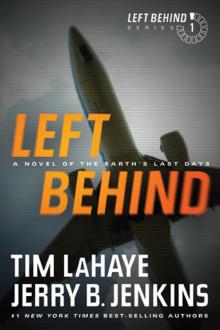 Left Behind: A Novel of the Earth's Last Days
Left Behind: A Novel of the Earth's Last Days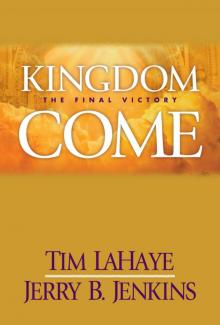 Kingdom Come: The Final Victory
Kingdom Come: The Final Victory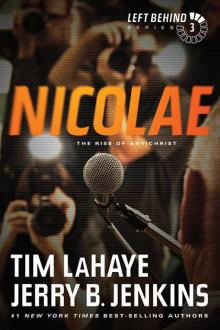 Nicolae: The Rise of Antichrist
Nicolae: The Rise of Antichrist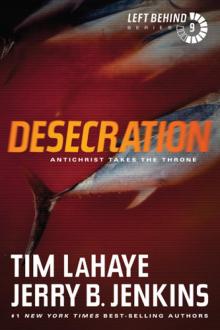 Desecration: Antichrist Takes the Throne
Desecration: Antichrist Takes the Throne Mark's Story: The Gospel According to Peter
Mark's Story: The Gospel According to Peter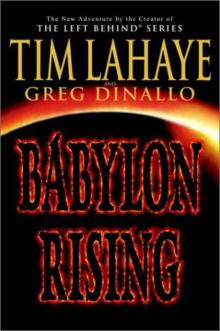 Babylon Rising
Babylon Rising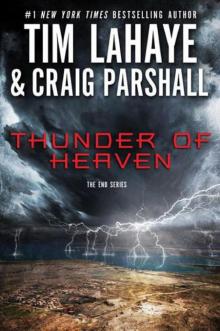 Thunder of Heaven: A Joshua Jordan Novel
Thunder of Heaven: A Joshua Jordan Novel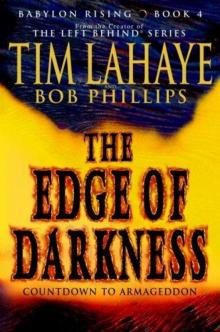 The Edge of Darkness
The Edge of Darkness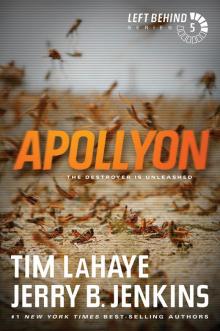 Apollyon: The Destroyer Is Unleashed
Apollyon: The Destroyer Is Unleashed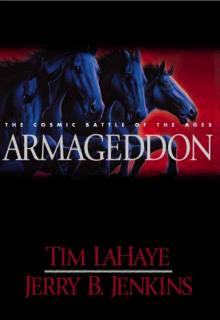 Armageddon: The Cosmic Battle of the Ages
Armageddon: The Cosmic Battle of the Ages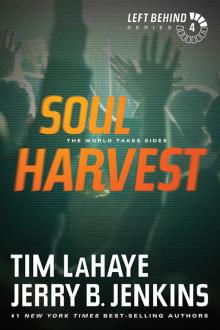 Soul Harvest: The World Takes Sides
Soul Harvest: The World Takes Sides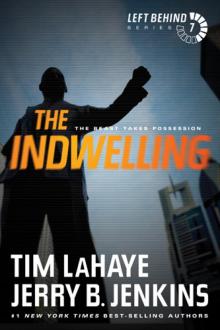 The Indwelling: The Beast Takes Possession
The Indwelling: The Beast Takes Possession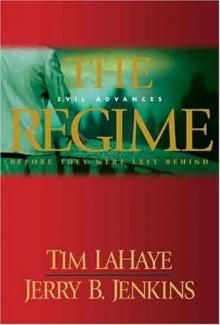 The Regime: Evil Advances
The Regime: Evil Advances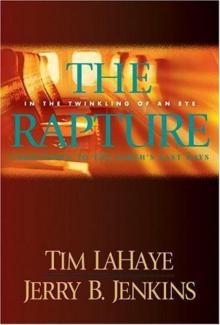 The Rapture: In the Twinkling of an Eye / Countdown to the Earth's Last Days
The Rapture: In the Twinkling of an Eye / Countdown to the Earth's Last Days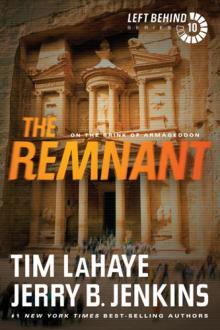 The Remnant: On the Brink of Armageddon
The Remnant: On the Brink of Armageddon John's Story: The Last Eyewitness
John's Story: The Last Eyewitness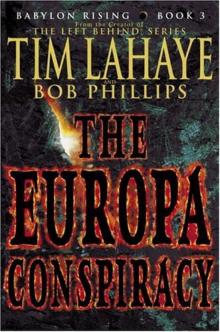 The Europa Conspiracy
The Europa Conspiracy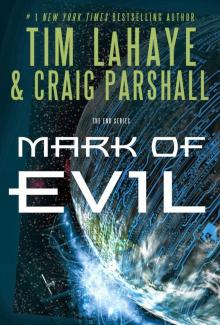 Mark of Evil
Mark of Evil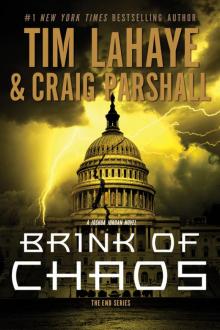 Brink of Chaos
Brink of Chaos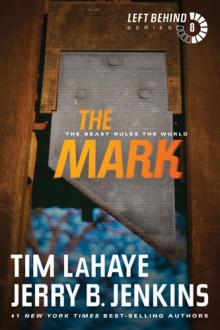 The Mark: The Beast Rules the World
The Mark: The Beast Rules the World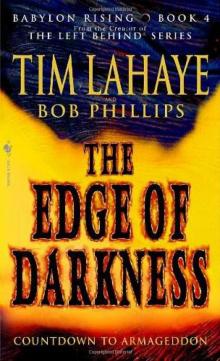 04 The Edge of Darkness
04 The Edge of Darkness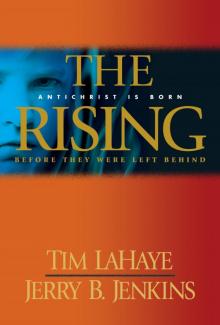 The Rising: Antichrist is Born / Before They Were Left Behind
The Rising: Antichrist is Born / Before They Were Left Behind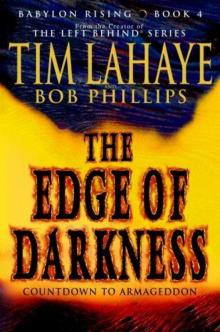 Babylon Rising: The Edge of Darkness
Babylon Rising: The Edge of Darkness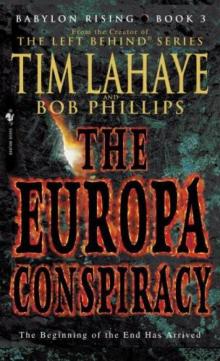 03 The Europa Conspiracy
03 The Europa Conspiracy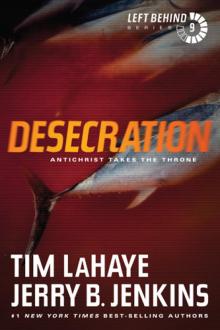 Desecration
Desecration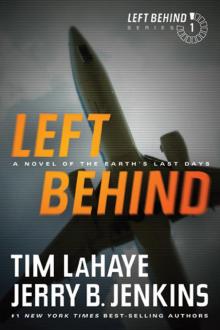 Left Behind
Left Behind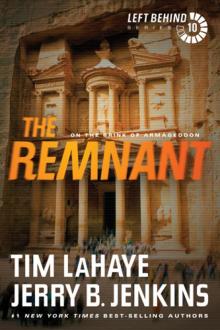 The Remnant
The Remnant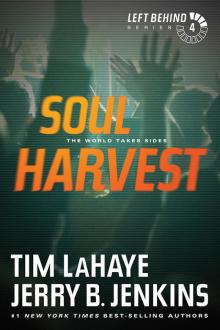 Soul Harvest
Soul Harvest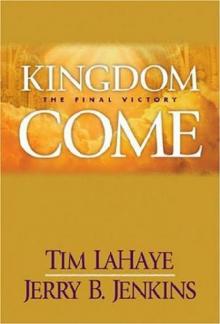 Left Behind Book 13: Kingdom Come The Final Victory
Left Behind Book 13: Kingdom Come The Final Victory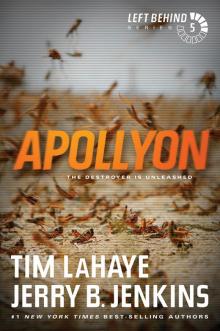 Apollyon
Apollyon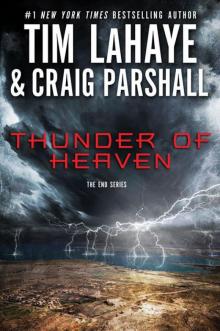 02 Thunder of Heaven: A Joshua Jordan Novel
02 Thunder of Heaven: A Joshua Jordan Novel Glorious Appearing
Glorious Appearing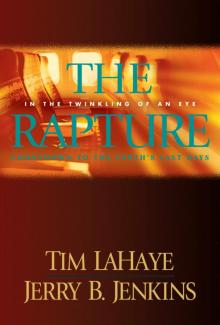 The Rapture: Evil Advances / Before They Were Left Behind
The Rapture: Evil Advances / Before They Were Left Behind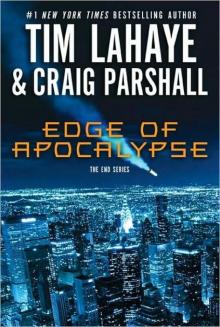 Edge of Apocalypse
Edge of Apocalypse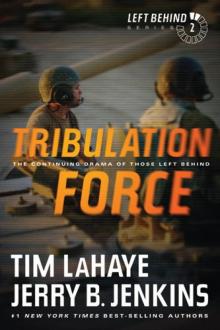 Tribulation Force
Tribulation Force The Left Behind Collection: All 12 Books
The Left Behind Collection: All 12 Books Black Friday
Black Friday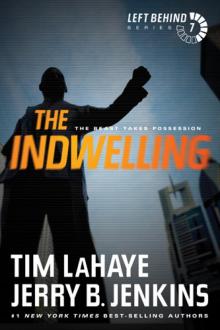 The Indwelling
The Indwelling The Left Behind Collection
The Left Behind Collection